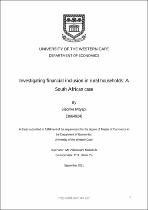| dc.description.abstract | People residing in rural areas generally struggle with many socio-economic problems, such as transport, health access, employment opportunities, poverty, inequality, access to essential services and facilities (e.g., piped water, electricity) as well as access to financial services. The global community has over the years came up with progressive measures directed at economic development and improvement of living standards, with one of them being financial inclusion (FI). FI is seen as one of the strategies to eradicate poverty, reduce unemployment and inequality as well as enhancing an inclusive economic growth.
This study investigated financial inclusion in rural households of South Africa, using the Finscope data (2011 and 2016), with the aim of examining the extent of financial inclusion in rural households. | en_US |

